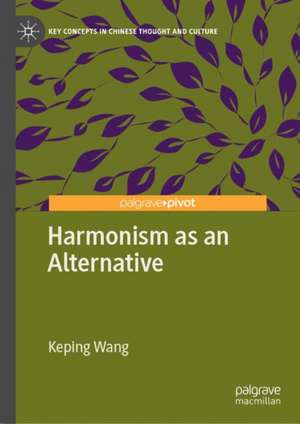Harmonism as an Alternative: Key Concepts in Chinese Thought and Culture
Autor Keping Wangen Limba Engleză Hardback – 22 ian 2019
Preț: 385.47 lei
Nou
Puncte Express: 578
Preț estimativ în valută:
73.77€ • 76.73$ • 60.90£
73.77€ • 76.73$ • 60.90£
Carte tipărită la comandă
Livrare economică 14-28 aprilie
Preluare comenzi: 021 569.72.76
Specificații
ISBN-13: 9789811335631
ISBN-10: 981133563X
Pagini: 121
Ilustrații: XVIII, 148 p. 4 illus., 2 illus. in color.
Dimensiuni: 148 x 210 mm
Greutate: 0.35 kg
Ediția:1st ed. 2019
Editura: Springer Nature Singapore
Colecția Palgrave Pivot
Seria Key Concepts in Chinese Thought and Culture
Locul publicării:Singapore, Singapore
ISBN-10: 981133563X
Pagini: 121
Ilustrații: XVIII, 148 p. 4 illus., 2 illus. in color.
Dimensiuni: 148 x 210 mm
Greutate: 0.35 kg
Ediția:1st ed. 2019
Editura: Springer Nature Singapore
Colecția Palgrave Pivot
Seria Key Concepts in Chinese Thought and Culture
Locul publicării:Singapore, Singapore
Cuprins
The Musical Mode.- The Cosmic Mode.- The Generative Mode.- The Synthetic Mode.- The Reciprocal Mode.- The Paradigmatic Mode.- The Dialectic Mode.- The Receptive Mode.- The Sentimental Mode.- Harmonism versus Conflictism.- Harmonism and Ecumenism.- Harmonism and Neo-Communitarianism.- Harmony and Justice.- The Harmonious Society in Question.
Notă biografică
Keping Wang is a Fellow of Chinese Academy of Social Sciences (CASS) where he was head of Aesthetics Section of CASS Institute of Philosophy from 2005 to 2016, philosophy professor of CASS Graduate School, and Professor of Beijing International Studies University where he worked as Director of Institute for Trans-cultural Studies over a decade. Professor Wang is a former visiting fellow of St. Anne’s College of Oxford University (2000), visiting Professor of the School of Philosophical and Historical Inquiry, Sydney University (2010) and Sciences Politiques de Bordeaux (2017). His major writings in Chinese include the Moral Poetics in Plato’s Laws (2015), Plato’s Poetics in the Republic (2005, 2014) and Aesthetics in Tourism (2015), with publications in English including the Rediscovery of Sino-Hellenic Ideas (2016) and Reading the Dao: A Thematic Inquiry (2011).
Textul de pe ultima copertă
This Key Concepts pivot considers the fundamental Chinese cultural ideal of harmony (hé/和). Historically originating from Confucianism, the concept of harmony sits at the heart of Chinese traditional culture, which is characteristically morality-based and harmony-conscious due to the central role of pragmatic reason and wisdom nurtured through Confucianism, Daoism, Mohism, Legalism and other schools of thought. This pivot delineates the rationale of the Chinese philosophy of harmony and its implications for modern social practices worldwide. It notably reexamines the relevance of hé beyond the realm of philosophy, and how this concept can impact on modern day human relations, amongst individuals and families as well as on a wider societal scale. It explores how hé can affect perspectives on political interaction, international relations and human conflict, as well as the interaction between man and nature. Addressing the inevitable tension between theory andpractice, this book argues for the very real relevance of hé in 21st century cultural, social, political and economic spheres in China and beyond.
Caracteristici
Considers one of the most fundamental Chinese cultural ideals, harmony (hé/?) Delineates the rationale of the Chinese philosophy of harmony and its implications for and impacts on modern social practices worldwide Addresses the inevitable tension between the theory and practice of Harmony









